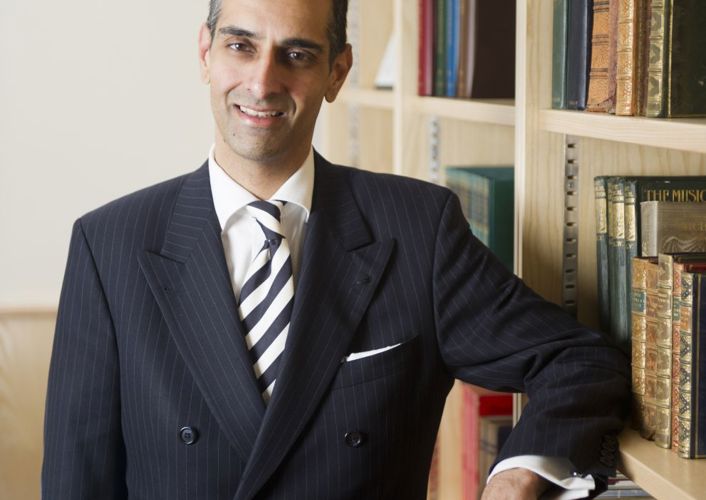Why the Chinese still choose a British independent education

Every year the Head of Streatham and Clapham High School, Dr Millan Sachania, travels to Hangzhou in China to visit parents of his pupils and their partner school, Wenlan Middle School. His reflections on the desire for British education.
Each year, in November, I travel to China with multiple motives. In the first place, to update the parents of our Chinese pupils (currently five in number) on their daughters’ progress. Secondly, to interview prospective pupils: though, like so many London day schools, we are heavily oversubscribed, I believe our community is much enriched by the perspectives that our overseas students bring. Next, to nurture our partnership with Wenlan Middle School, one of the leading educational establishments in Hangzhou, a prosperous city near Shanghai (I think of it as a Chinese Stuttgart), whose pupils participate in an annual summer school each year at SCHS. And, finally, to catch up with the Hangzhou Voices of Youth Choir, of which I am patron. Founded a year ago by my educational associates in China, it is arguably the first and only youth choir seriously exploring the Western musical canon in China (other than in Hong Kong).
As ever, I embarked on an unremitting procession of radio interviews, presentations, lectures, seminars, and school visits. This year, I visited some seven state, independent, boarding, primary and senior schools, a highlight being my teaching a music lesson to a ‘class’ of 300 pupils. My recent experiences, together with those of my previous visits in 2012 and 2013 to schools in Shanghai and Peking, prompt the following reflections.
On my visits to Chinese schools, I am unfailingly struck by the pupils’ cheerful, irreverent (in the best sense) attitude and their exuberant welcome. A reflection perhaps of how far their nation has progressed since the days of the Cultural Revolution. Mao’s cadets of the ’60s and ’70s would surely scarcely recognise the prevailing educational environment, which is not least characterised by the warm, informal relationships between pupils and teachers evident in both classrooms and corridors. The schools are large. Single-sex education is virtually unknown. I laboured to persuade teachers and pupils that my institution, a member school of the Girls’ Day School Trust, is far from being a nunnery.
The education offered by mainstream independent schools in the UK is clearly held in great esteem by those parents who are informed punters in the international educational market. There are two principal reasons for this.
First, a perception that our sector strives to promote independent thinking and active learning. Pupils at Chinese schools are under unassuaging pressure to arrive at the ‘right’ answer; but the journey that might lead them to it is not usually valued for its own sake. There is little emphasis on promoting creative learning, taking intellectual risk, and building skills through the analysis of error.
An impressive female mechanical engineer from Birmingham whom I met on my travels elucidated this further; she is a long-serving employee of a leading British company with considerable overseas interests. She observed that much of her work in the Far East focused on dealing with the inertia caused by the failure of formerly reliable systems or processes, which left local managers at a loss. Specialist scientific knowledge and skills, which the Far East has in abundance, are of little practical benefit to her industry unless combined with bold, creative and innovative approaches to problem-solving.
In this context, then, it is scarcely surprising that my comments to prospective parents on how much our sector values the development of the thought process and a capacity for thinking unfettered by preconception, dogma and habit elicited much interest.
Secondly, the rich traditions of the schools in our sector, and the way in which the best schools use their historical values to promote, not constrain, their commitment to excellence. This gives the British independent school an edge over the US alternatives in the judgment of many Chinese parents (and, indeed, pupils); as does the perception that the British are generally more cultured and rounded than the Americans, more civilised, genteel and reserved in their manner and approach to life. I must confess that I did little to disabuse parents and pupils of this notion. Those inhabiting the top stratum of Chinese society—and there are a lot of them—have almost unimaginable reserves of wealth. The shops of luxury designer brands flourish in such cities as Shanghai and Hangzhou. Astonishingly, their prices generally exceed those of their London branches. The prosperous denizens of these cities make a statement by carrying these brands’ boutique, neatly formed cardboard bags (the sort with ropes as handles) as they go about their daily business. My school has such carriers for our promotional literature. I had taken some with me, and thus to my delight I found I could fit in with the look.
As I brandished this bag on one of my walks I met a gentleman who was perturbed that he hadn’t encountered the boutique ‘shop’ that I was advertising, indubitably an elite brand worth discovering. Or perhaps this ‘shop’ was on the fashionable King’s Road in London? I had to work hard to persuade him that our logo and design referred to a school, not a shop. ‘Not so different,’ he returned, when the penny dropped. Well, yes: perhaps up to a point our schools are indeed luxury brands. But I wish I had had the opportunity to explain that the noblest aim of education is surely to empower pupils to embrace a philosophy of life that transcends shallow consumeristic values. But he was fast gone—doubtless towards his next purchase at a designer salon.
